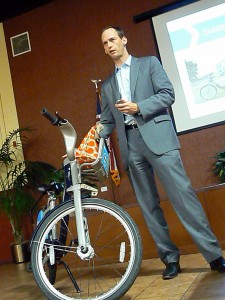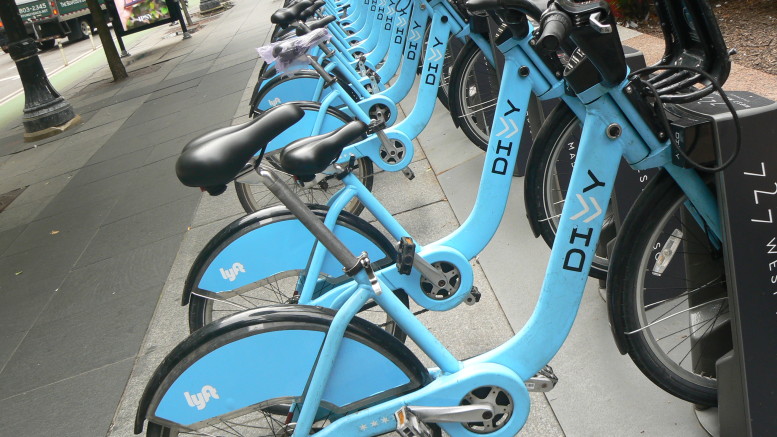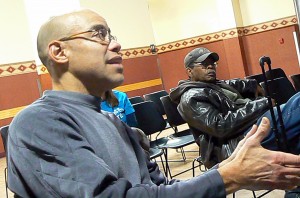by La Risa Lynch

CDOT’s Scott Kubly speaks at a community forum about the city’s bike share program. Bronzeville activists raised concerns how the program will boost economic development and tourism.
The new protected curbside bike lanes cropping up across the city is part of Mayor Rahm Emanuel’s grand plan of creating a bike friendly Chicago.
As part of that plan, the city is establishing a bike share program that allows individuals to pick up and drop off bikes at kiosks planted throughout the city for a fee. The program cost $75 for a yearly membership, but allows daily passes for $7 for 30 minute trips. The city hopes to get the bike share program off and rolling next spring in 26 city wards.
City officials speaking at a November 7th community meeting at the Charles Hayes Center, 4859 S. Wabash Ave., touted the program as a healthy low-cost transportation option that can be tied to job creation. City officials contend the bike share program will create 150 permanent jobs in addition to temporary construction jobs. The program will be self-sustaining through membership fees and sponsored advertising.
But Bronzeville community activists want to know how this program will boost economic development and tourism in the gentrifying neighborhood. Part of the program’s footprint reaches into that community. The program will be implemented in densely populated and affluent areas. It stretches into Hyde Park and encompasses the Near West and North Sides.
Chicago Department of Transportation officials have held several community meetings to garner suggestions on where to install the bike share stations. The city has a website to solicit suggestions and has collected nearly 1000 ideas already.
Initially, the city wanted to install 300 bike station containing 3000 bikes, but a federal grant will allow the city to install an additional 100 stations and 1000 bikes. The city will own the equipment, but the program will be operated by Alta, an Oregon- based company that operates bike share programs in Washington D.C., Boston and Melbourne, Australia.
Harold Lucas, president and CEO Black Metropolis Convention and Tourism Council and an avid cyclist, noted that Bronzeville is an international tourism destination known for its blues, jazz and gospel influences. The community has several buildings of historical note including the Supreme Life Building — something the bike sharing program can capitalize on.
“I see that having these bicycles available and where they put them at as being a catalyst for attracting people to those destinations,” Lucas said.
CDOT’s Scott Kubly said finding locations is what these meetings are about. Typically, stations will be located near rail stations, retail hubs, grocery stores and business districts.
He said CDOT will work with aldermen and community groups to strategize best spots to place the kiosks. But Kubly cautioned that economic development will not automatically spring up if a bike sharing station is placed in front of a building.
“But what it can do is strengthen connection to existing destinations,” said Kubly, a CDOT managing deputy.
However Bernard Loyd, of Bronzeville Urban Juncture, an economic development company, expressed concern how the program will attract minority users, especially in low-income communities within the bike share’s footprint.
Loyd noted a limited number Bronzeville residents ride bikes. A bike share program, he added, could help increase access to this fun healthy activity
“I think it is a huge opportunity for us because it is the cheapest form of transportation…,” Loyd said.
Lucas and Loyd urged the city and Alta to develop effective outreach initiatives to get program participation. He said there are vendor opportunities to maintain the facilities or chances to partner with the Blackstone Bicycle Co-op to provide job training. The co-op teaches Black youths to fix bicycles.
Investing in biking infrastructure should be an economic driver for underserved communities especially if utilizing federal stimulus dollars, Lucas contends.
Most urban communities, he noted are “being redeveloped not necessarily for us and we are not going to sit around and allow ourselves to be priced out of our neighborhood while we have a Black president in the White House who is putting resources” in such infrastructure programs.
Lucas challenged local politicians and “people who are getting these contracts” to be accountable in leveraging this program for low income areas.
Kubly explained such benchmarks are not in the Alta’s contract. But he made a personal commitment to accommodate residents concerns. He noted that the contract does specify an internship program for city youth.
“Alta needs to make money operating this system, so they need to focus on growing their membership base. That their goal,” Kubly said. “My personal goal is to make sure the workforce reflects the diversity of the city as does the membership.”


Be the first to comment on "Can city’s bike share program be economic boom for Bronzeville"